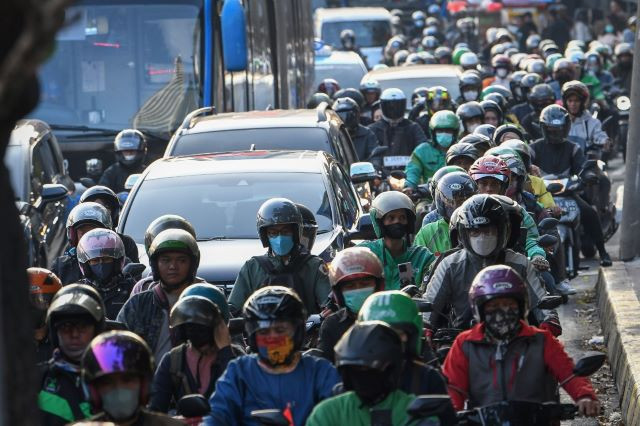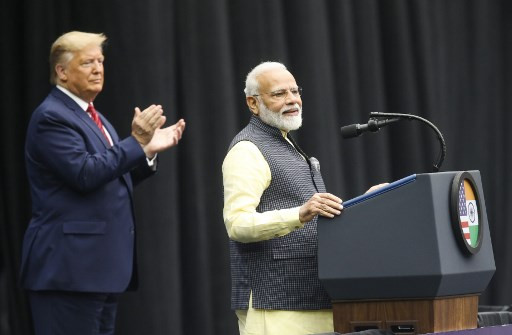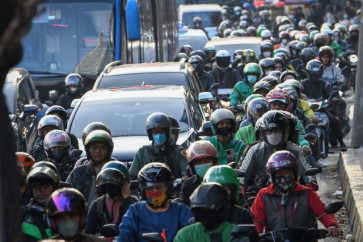Popular Reads
Top Results
Can't find what you're looking for?
View all search resultsPopular Reads
Top Results
Can't find what you're looking for?
View all search resultsYearender: Jakarta public transportation improves but many will still prefer cars
People living in the city and its surroundings will likely remain reliant on private vehicles, experts say, citing an urgent need for a drastic improvement of the public transportation system.
Change text size
Gift Premium Articles
to Anyone
 Smoky trail: Motorcyclists compete for space on Aug. 24, 2023 in bumper-to-bumper congestion on Jl. Gatot Subroto in South Jakarta. Data from the Environment and Forestry Ministry shows that the transportation sector contributes 96.36 percent to Jakarta’s carbon dioxide output. (Antara/Aditya Pradana Putra)
Smoky trail: Motorcyclists compete for space on Aug. 24, 2023 in bumper-to-bumper congestion on Jl. Gatot Subroto in South Jakarta. Data from the Environment and Forestry Ministry shows that the transportation sector contributes 96.36 percent to Jakarta’s carbon dioxide output. (Antara/Aditya Pradana Putra)
E
xperts have cautioned that Jakarta’s public transportation system journey is far from complete, despite the introduction of major new railways this year, and therefore most of the city’s congestion and pollution will likely persist far into the future.
Jakarta’s traffic has worsened since the easing of pandemic restrictions, with the city now sitting at 29th place in the TomTom Traffic Index Ranking for 2022, from 46th and 31st in the previous two years, respectively, meaning people on average spent longer to get from one point to another within the capital.
On Aug. 9 of this year, Swiss air quality monitor IQAir declared Jakarta the world’s most polluted city, with transportation seen as the second largest contributor to the poor air quality, prompting the government to take measures ahead of the ASEAN summit that took place in the city the following month.
During the same year, the city saw the 42-kilometer Greater Jakarta light rail transit (LRT) begin operations on Aug. 28, connecting the capital with the metropolitan areas of Bekasi and Depok in West Java.
The additional train came on top of the existing 16-km mass rapid transit (MRT) system and the 5.8-km Jakarta LRT, as well as the 251-km Transjakarta bus system.
The government also inaugurated the Whoosh high speed railway (HSR) on Oct. 2, which it hoped would ease congestion and pollution between Jakarta and Bandung.
However, people living in the city and its surroundings will likely remain reliant on private vehicles, experts say, citing an urgent need for a drastic improvement across the public transportation system.

















